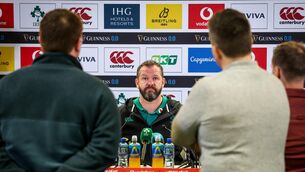Peter Jackson: Rugby was turned upside down and inside out

France's winger Damian Penaud celebrates his try in Saturday night's win over New Zealand at the Stade de France.
Of all the startling scorelines over the last seven days, the most staggering emerged Sunday in Dublin as a result of Ireland duly taking Argentina to the cleaners: Europe 4 Southern Hemisphere 0.
The domino effect of a rugby weekend like no other began with a rejuvenated England outwitting the world-beating Springboks, a ravaged Wales making the Wallabies pay for their gross indiscipline and France daring to run the All Blacks off their feet.









